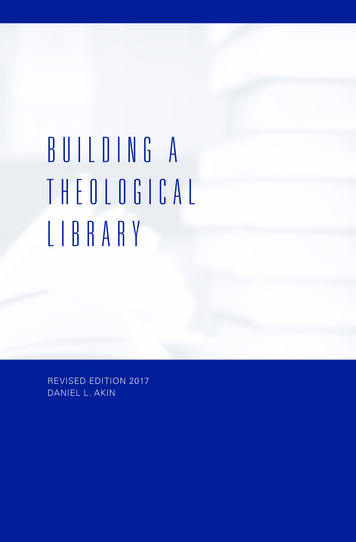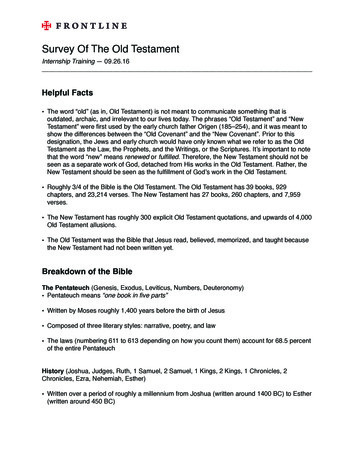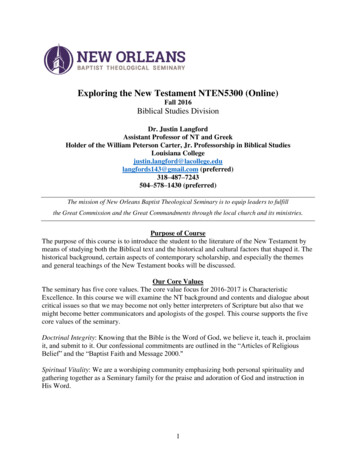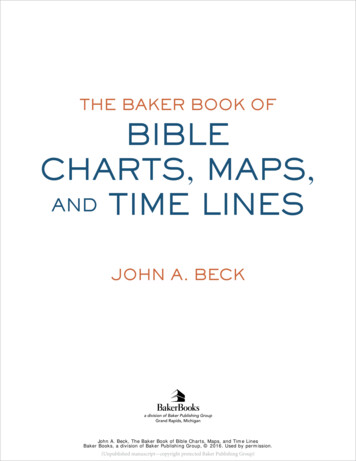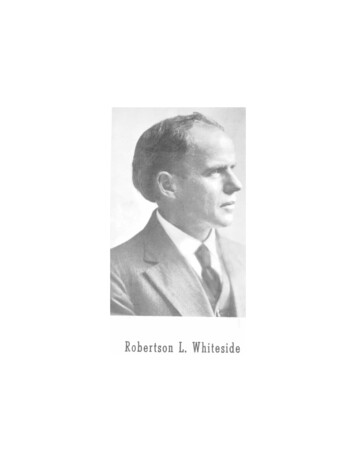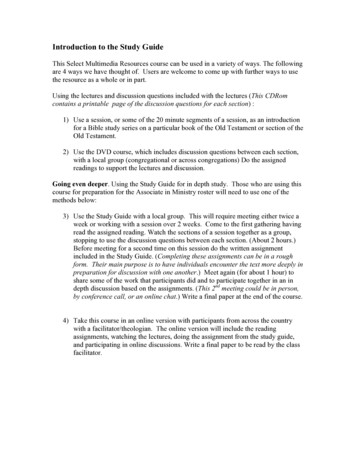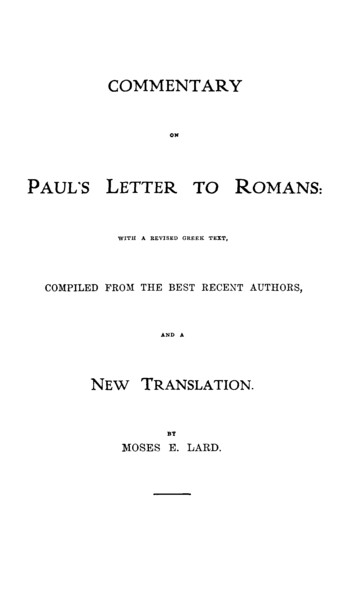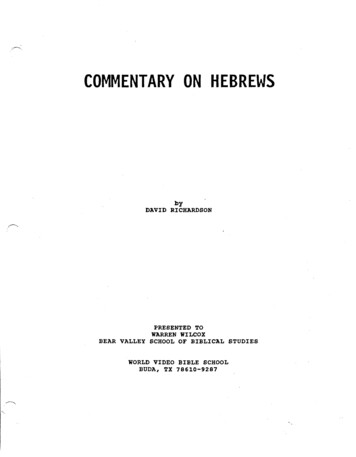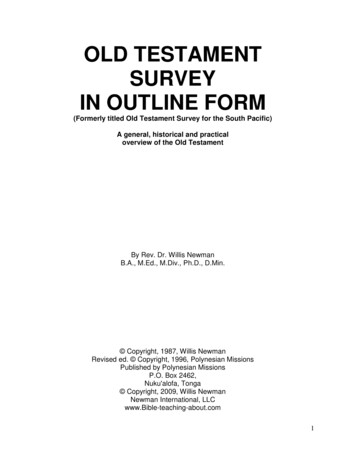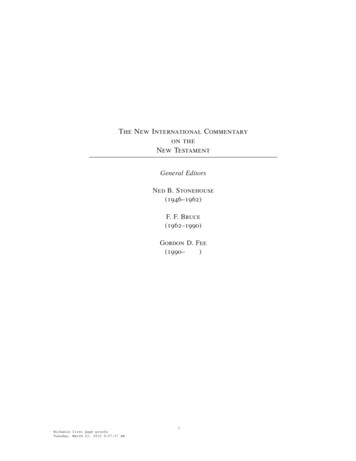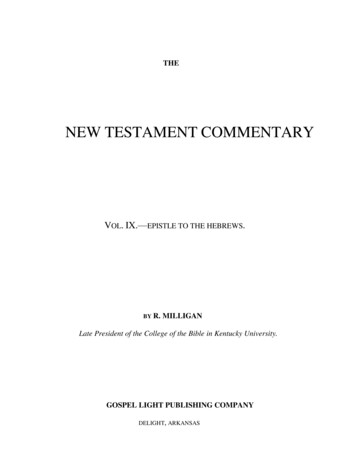
Transcription
THENEW TESTAMENT COMMENTARYVOL. IX.—EPISTLE TO THE HEBREWS.BY R.MILLIGANLate President of the College of the Bible in Kentucky University.GOSPEL LIGHT PUBLISHING COMPANYDELIGHT, ARKANSAS
Printed in U. S. A.
PUBLISHERS' PREFACE.IN announcing the volume on Hebrews of the NEW TESTAMENT COMMENTARY, we are painedto state that the author of it did not live till it had passed through the press. Still, we arerejoiced that his work on it was complete before he was called away from this scene of hislabors. We doubt not the work will be received as a valuable contribution to Biblical criticismon its own merits. It will be doubly dear to a host of friends of the deceased who had thehighest regard for him personally while living, and who, now that he has passed into thespirit-land, hold him in most affectionate remembrance. A brief sketch of his life andcharacter will be found at the end of this volume.For writing this volume on Hebrews, President Milligan possessed some very rarequalifications. He was a man of most deep and fervent piety. This brought him into closesympathy with our Savior in his mediatorial and priestly offices. Then his general andaccurate scholarship, his practical experience as a teacher, and above all his ardent love forthe truth, and nothing but the truth, at once made it impossible for him to fail in a work ofthis kind. The volume is not burdened with new interpretation or original views. The authorhas aimed to be safe rather than brilliant; faithful to the Divine Spirit rather than original; andeminently practical rather than novel. Still it shows that he had decided opinions of his own,and these are always freely given when it is thought to be necessary. Nevertheless, the workis decidedly .conservative. Every-where we see stamped upon it this peculiar characteristic ofthe author's mind. President Milligan was naturally a very prudent man, while his profoundreverence for the word of God, and his constant anxiety lest he might lead some one astray,tended to quicken the natural bent of his(iii)
ivPUBLISHERS' PREFACE.mind, and shut out all doubtful interpretations, even when the temptation was very great. Andit ought to be said, furthermore, that not only his habits of mind, but his studies as well, ledhim to discredit every thing in the new school of criticism, and threw him largely upon theold critics for help. Hence his work from beginning to end has the flavor of the old authors,and may be said to occupy a middle ground between the old and new schools of criticism.While it relies chiefly on the old English commentators as authorities, it is nevertheless wellup to the demands of the present times in Biblical criticism.The plan of this volume does not materially differ from the one on Matthew and Mark, andyet there are some features in this that are specially worthy of mention. It will be noticed thateach section is preceded by a very careful and full analysis. This we think will be foundvaluable to the student as helping him at once to comprehend the whole argument. Besidesthis, each section is followed by practical reflections which are always interesting andsometimes of great value. These supply largely a homiletical part which we doubt not will bevery acceptable to most students and especially preachers of the gospel.The author had made the study of topology a specialty for many years of his life, and he hasfreely given us the results of his studies in this volume. And it is believed that his treatmentof the types will receive the highest commendation from those who are at all competent tojudge. We feel confident that this interesting study will receive new interest from whatPresident Milligan has written, and we do not hesitate to call special attention to this portionof his work.
INTRODUCTION.THE main historical circumstances of this Epistle may be summed up and consideredunder the following general heads:I. By whom was the Epistle written?II. Is it, or is it not, of canonical authority?III. To whom was it written?IV. For what purpose was it written?V. When and where was it written?VI. In what language was it written?SECTION I.BY WHOM WAS THE EPISTLE WRITTEN?Some have ascribed it to Clement of Rome; some to Barnabas, the companion of Paul;some to Silas or Silvanus; some to Apollos; some to Aquila; some to Mark; and some to Paulthe Apostle. These hypotheses have all been maintained by able critics, and with some showof reason, as any one may see by referring to Davidson's Introduction to the New Testament,Alford's Prolegomena, or Stewart's Introduction to this Epistle. But to my mind, it is quiteevident that the last of these is the only hypothesis that is really worthy of our consideration,because it is the only one that is sustained by any reliable evidence. The others are all purelyconjectural; and hence if it can be shown that Paul did not write the Epistle, then indeed wemay as well give up all further inquiry about its authorship, and wait patiently for therevelations of the day of judgment. But that it is one of Paul's genuine Epistles seems, atleast, quite probable from the following considerations:(5)
6EPISTLE TO THE HEBREWS.I. It is ascribed to Paid by many of the Christian Fathers, who, so far as we know, had thebest means of information with regard to both its genuineness and its authenticity.1. The first of these is PANTAENUS, an eminent Oriental scholar, who was for several yearsPresident of the Catechetical School of sacred learning in Egypt. He flourished about A. D.180, and he is spoken of by Eusebius and Jerome as a man of great learning and influence.None of his writings are now extant, but his testimony with regard to the authorship of theEpistle to the Hebrews is given by Clement of Alexandria in his work called Hypotyposis(Institutions). The work itself is now lost, but Clement's testimony, embracing that ofPantaenus, is given in an extract from it, preserved by Eusebius in the fourteenth chapter ofthe sixth book of his Ecclesiastical History. In this extract, Clement is attempting to explainwhy it is that Paul did not connect his name with the Epistle, and after giving his ownopinion, he says, "But now as the blessed Presbyter [Pantaenus] used to say, Since the Lord,who was the Apostle of the Almighty, was sent to the Hebrews, Paul, by reason of hisinferiority, as if sent to the Gentiles, did not subscribe himself an Apostle to the Hebrews,both out of reverence for the Lord, and because he wrote of his abundance to the Hebrews, asa herald and Apostle to the Gentiles."This testimony is very direct, and comes from one who had rare opportunities of judgingcorrectly about such matters. He had heard, as we learn from Photius, those who had seen theApostles; and according to Eusebius (Eccl. Hist. B. v. 10), he was, on account of his greatlearning and piety, sent by Julian, Bishop of Alexandria, as a missionary to the East, even asfar as to India. He was also, according to the same historian (Eccl. Hist. B. vi. 14), veryhighly commended by Alexander, Bishop of Jerusalem, about A. D. 212. And hence it wouldseem that the testimony of Pantaenus is entitled to very great respect in the settlement of thisquestion. In matters of opinion he was of course liable to err, as we all are, and I do nottherefore attach much importance to the reason which he assigns, in explanation of the fact,that Paul did not attach his name to the Epistle.2. Next to the testimony of Pantaenus comes that of CLEMENT of Alexandria. He was forsome time a pupil of Pantaenus, and about A. D. 187 he succeeded him as President of theCatechetical School in Alexandria. His birthplace is uncertain, but in his Stromata(Miscellanies), he tells us that he had been instructed by one teacher in Italy, one in Greece,two in the East, and one in Egypt. (Lard. Cred.
AUTHORSHIP.7Vol. ii. 22.) He was therefore, no doubt, well acquainted with the prevailing opinions of boththe Eastern and Western churches, touching the Canon of the Holy Scriptures.In his Ecclesiastical History (B. vi. 14), Eusebius has recorded the testimony of Clement withregard to the authorship of our Epistle. Eusebius says, "In his work called Hypotyposis, he[Clement] affirms that Paul is the author of the Epistle to the Hebrews; and that, as it wasaddressed to the Hebrews, it was originally written in their language, and afterwardtranslated by Luke for the Greeks;—which is the reason why the coloring of the style is thesame in this Epistle and in the Acts of the Apostles. The reason why Paul did not affix hisname to the head of it, probably is, because the Hebrews had conceived a prejudice againsthim, and were suspicious of him. Very prudently, therefore, did he not place his name at thehead of the Epistle, so as to divert them from the perusal of it."In his other works, Clement testifies several times to the same effect, touching theauthorship of this Epistle.3. Our next witness is the celebrated ORIGEN. He was born in Egypt about A. D. 185, andwas, from his youth, thoroughly instructed in both religion and philosophy. At the early ageof eighteen he was made Principal of the Catechetical School in Alexandria, and in or aboutA. D. 213, he went to Rome in quest of religious knowledge. Afterward, he also visitedGreece, Arabia, and Asia Minor, and in A. D. 231 he left Alexandria in Egypt, and went toCaesarea in Palestine, where he was long honored and respected by Alexander of Jerusalem,and other Bishops of the East. Jerome calls him, "The greatest doctor of the Church since theApostles." And again he says, that he himself would willingly undergo all the hatred thatOrigen had endured, if he had only his knowledge of the Holy Scriptures. (Lard. Cred. Vol.ii. 38.)The testimony of this eminent scholar is therefore entitled to very great weight in thesettlement of the question before us. This he has given very explicitly in several of his works.In his letter to Africanus, for example, he says, "But possibly some one pressed with thisargument will have recourse to the opinion of those who reject this Epistle. as not written byPaul. In answer to such a one, we intend to write a separate discourse to show that Epistle tobe Paul's."Still more full and explicit is his testimony given in the following extract from Eusebius(Eccl. Hist. B. vi. 25). This learned historian says. "Origen decides thus in his Homilies uponit: The character of the style of the Epistle
8EPISTLE TO THE HEBREWS.to the Hebrews has not the unpolished cast of the Apostle's language, who professed himselfto be a man unlearned in speech; that is, in phraseology. Besides, this Epistle, in the textureof its style, is more conformed to the Greek idiom, as every one must confess who is able todistinguish differences in style. Moreover, the ideas in the Epistle are admirable, and notinferior to those which are confessedly apostolic: and that this is true, every one mustconcede who has attentively read the writings of the Apostles. A little further on he [Origen]adds, If I were to give my opinion, I would say the phraseology and the texture belong tosome one relating the Apostle's sentiments, and, as it were, commenting on the words of hismaster. If any church, therefore, holds this to be an Epistle of Paul, let it receivecommendation on account of this; for it is not without reason that the ancients have handed itdown as Paul's. Who wrote the Epistle, God only knows with certainty: but the report whichhas reached us, is that some affirm it to be written by Clement, Bishop of Rome; and some,by Luke, who wrote the Gospel and the Acts."To some it may seem as if this testimony of Origen, given in his Homilies, is inconsistentwith that' which is given in his letter to Africanus, for in that he expresses his unqualifiedconviction that Paul is the author of the Epistle, and he avows his intention to write adiscourse in proof of this; but in the extract from his Homilies he says, "Who wrote theEpistle God only knows certainly." By this remark, however, he evidently does not intend toexpress any doubt as to the authorship of the Epistle, but only as to the person who in thiscase acted as Paul's amanuensis. He seems to think that as Tertius wrote the Epistle to theRomans (Rom. xvi. 22), so also in the present case some skillful rhetorician wrote for himthe Epistle to the Hebrews, taking, perhaps, at the same time, with Paul's consent andapproval, some liberty with regard to the style and phraseology of the Epistle. Butnevertheless in the latter extract, as well as in the former, he seems to agree with "theancients" that the thoughts are Paul's, and that he is therefore the real and proper author ofthe Epistle.4. From the testimony of Origen we pass next to that of THE COUNCIL OF ANTIOCH. ThisCouncil first met in A. D. 264, and was composed of about seventy or eighty Bishops,representing the most enlightened and influential churches in Western Asia. In a synodicalletter written by this Council near the close of its second session in A. D. 269, touching thetrial and condemnation of Paul of Samosata,
AUTHORSHIP.9the Epistle to the Hebrews is ascribed to the same Apostle that wrote the first and secondEpistles to the Corinthians. This is apparent from the following extracts. The Bishops say,"Now the Lord is that Spirit, according to the Apostle [2 Cor. iii. 17]. And according to thesame, For they drank of the spiritual rock, etc. [1 Cor. x. 4].------And of Moses the Apostlewrites, Esteeming the reproach of Christ greater riches, etc. [Heb. xi. 26]." See Davidson'sIntroduction to the New Testament, Vol. iii. p. 191. There is scarcely any room to doubt thatby "the Apostle" in this extract, the writer of this letter and the other members of the Councilmeant Paul the Apostle. And, if so, then this testimony shows very clearly what was at thattime the general opinion of the Eastern churches with respect to the authorship of the Epistleto the Hebrews; for this Council was composed of many of the most learned Bishops andPresbyters of Western Asia.5. The next prominent witness in order is EUSEBIUS the historian. He was born in Caesareain Palestine about A. D. 264; and in A. D. 320, or perhaps sooner, he was made Bishop ofthe Church in that city. He became greatly distinguished for his piety and his learning, andwas inferior to none of his contemporaries in his knowledge of ecclesiastical affairs. Therecan be no doubt, therefore, that he was well qualified to bear testimony in the case before us.This he has done repeatedly in his Ecclesiastical History. In B. iii. 3, for instance, he says,"Fourteen Epistles are clearly and certainly Paul's: although it is proper to be known thatsome have rejected that which is written to the Hebrews, alleging that it is spoken against asnot belonging to Paul." In B. iii. 25, he classifies "the Epistles of Paul" among those thatwere received as canonical. And in B. iii. 38, speaking of the epistle of Clement, he says, "Inwhich, inserting many sentiments of the Epistle to the Hebrews, and also using some of thevery words of it, he [Clement] plainly manifests that that Epistle is no modern writing, andhence it has not without reason been reckoned among the other writings of the Apostle. ForPaul having written to the Hebrews in their own language, some think that the EvangelistLuke, and others that this very Clement, translated it [into Greek]; which last opinion is themore probable of the two, there being a resemblance between the style of the epistle ofClement and of that to the Hebrews; nor are the sentiments of these two writings verydifferent."From these citations it is manifest that Eusebius received the Epistle to the Hebrews as oneof Paul's genuine letters:
10EPISTLE TO THE HEBREWS.though, like Origen, he seems to have thought that some other person had translated whatPaul had himself originally dictated.After the age of Eusebius, this Epistle was commonly received throughout the East as anEpistle of Paul. Indeed, it was very generally so regarded from the beginning in the Egyptian,Greek, and Syrian churches. It was chiefly in the West that its Pauline authorship was, for atime, denied or doubted. About A. D. 180, Irenaeus, Bishop of Lyons in Gaul, is supposed tohave denied its Pauline origin. We have no direct testimony from him touching this matter;but according to Photius, Bishop of Constantinople, Stephen Gober, a writer of the sixthcentury, says, "Hyppolytus and Irenaeus say that the Epistle of Paul to the Hebrews is nothis." (Lard. Cred. Vol. ii. p. 165.)Soon after this, about A. D. 190 or 200, Tertullian, a learned and noted Presbyter of theChurch at Carthage in North Africa, ascribed this Epistle to Barnabas, the friend andcompanion of Paul. In his defense of the rigid disciplinary views of the Monanists (DePudicitia, cap. 20), having, as he supposed, sufficiently proved his point from the otherEpistles of Paul, and the first Epistle of John, he proceeds as follows: "Nevertheless, I amwilling, over and above, to allege the testimony of a companion of the Apostles; a fit personto show, at the next remove, what was the sentiment of the masters. For there is an Epistle ofBarnabas, inscribed To THE HEBREWS, written by a man of such authority that Paul hasplaced him with himself in the same course of abstinence: Or I only and Barnabas, have notwe power to forbear working (1 Cor. ix. 6)? And certainly the Epistle of Barnabas [by whichhe means the Epistle to the Hebrews] is more generally received by the churches than theapocryphal Pastor of adulterers [the Shepherd of Hermas]. Admonishing then his disciples,he exhorts them to leave all first principles, and rather to go on to perfection, and not to layagain the foundation of repentance from the works of the dead. For it is impossible, he says,for those who were once enlightened, and have tasted of the heavenly gift, and were madepartakers of the Holy Spirit, and have tasted of the sweet word of God, if they shall fall awaynow at the end of the world, to recall them again to repentance, since they crucify again theSon of God to themselves, and put him to an open shame. He who learned this from theApostles, and taught with the Apostles, never knew that a second repentance had beenpromised by the Apostles to an adulterer and a fornicator. For
AUTHORSHIP.11he excellently interprets the law, and shows its figures in the truth." (Lard. Cred. Vol. ii. p.27.)About the same time, or perhaps a little later, Caius, a learned Presbyter of Rome, seems tohave also doubted the apostolic origin of this Epistle; so, at least, the case is represented to usby Eusebius. This historian says (Eccl. Hist. B. vi. 20), "There is, besides, a discussion thathas come down to us, of Caius, a most eloquent man, held at Rome in the time ofZephyrinus, against Proclus, who contended exceedingly for the Phrygian heresy[Montanism]; in which, while he censures the rashness and daring of his opponents incomposing new scriptures, he makes mention of thirteen Epistles of the holy Apostle, notreckoning that to the Hebrews with the rest. And indeed, to this very time, by some of theRomans, this Epistle is not thought to be the Apostle's."Several other Latin writers of the third century are often cited as witnesses against thePauline authorship of this Epistle; such as Cyprian, Bishop of Carthage; Novatian, aPresbyter of Rome; and Victorinus, Bishop of Pettau in Pannonia. But the testimony of thesewriters is chiefly negative, implying doubt or uncertainty, rather than opposition. And thisuncertainty prevailed in the West till about the middle of the fourth century. Then the tide ofpopular sentiment began to change; and soon after that the Epistle was acknowledged to beone of Paul's genuine works by Hilary, Bishop of Poictiers; Lucifer, Bishop of Milan, andseveral other Western writers of some note.6. But it was not till after the time of JEROME, A. D. 392, that the apostolic origin of theEpistle to the Hebrews was generally acknowledged in the Western churches. Jerome himselfbelieved with the Greek Fathers that it was one of Paul's genuine Epistles, But many of hisLatin contemporaries still entertained doubts concerning it. This is evident from sundrypassages found in the writings of this most learned of all the Latin Fathers. But the followingextract from his letter to Dardanus will suffice for illustration at present. He (Jerome) says,"This much must be said by ours, that this Epistle which is inscribed To THE HEBREWS, isreceived as the Apostle Paul's, not only by the churches of the East, but by all theecclesiastical writers of former times; though most [of the Latins?] ascribe it to Barnabas orClement; and that it makes no difference whose it is, since it belongs to an ecclesiasticalman, and is daily read in the churches. But if the Latins do not commonly receive it amongthe canonical Scriptures, the Greek churches do the
12EPISTLE TO THE HEBREWS.same with the Apocalypse of John. We, however, receive both; not following the usage ofthe present time, but the authority of the ancient writers, who for the most part quote both;not as they were wont to quote sometimes apocryphal books, but as canonical."7. Contemporary with Jerome was AUGUSTINE, Bishop of Hippo in North Africa. Amongthe Latin Fathers, he stood next to Jerome in point of scholarship; and in his profound anddiscriminating judgment of men and things, he was inferior to none of them. In hisCommentary on the Epistle to the Romans he says, "Paul had a like salutation at thebeginning of all his Epistles, with the exception of that which he wrote to the Hebrews;where he is said to have omitted his ordinary salutation designedly, lest the Jews who wereobstinately opposed to him, taking offense at his name, should either read with an unfriendlymind, or neglect altogether to read what he had written respecting their salvation. For whichreason, some have been afraid to receive that Epistle into the Canon of Scripture."Soon after this, the Epistle to the Hebrews was received, as a genuine Epistle of Paul, by theCouncil of Hippo and also by the third Council of Carthage. Other churches in the West soonacquiesced in the more enlightened judgment of their brethren in the East; so that from aboutthe beginning of the fifth century to the time of the Protestant Reformation in the sixteenth,the Pauline authorship of this Epistle was almost universally acknowledged in the Western aswell as in the Eastern churches.From these premises, then, it seems, quite evident,1.That in the East, where the Epistle to the Hebrews was received, and where of course itshistorical circumstances were best understood, it was from the beginning indorsed by themost enlightened ecclesiastical writers, as an Epistle of Paul.2 That for a time, many of the Western Fathers were in doubt concerning it. But that aftermore mature investigation, the churches of the West, as well as those of the East, wereconstrained to admit its Pauline authorship.From all of which, it follows with a very high degree of probability, if indeed not withabsolute certainty, that the Epistle to the Hebrews is one of Paul's genuine Epistles.II. This conclusion is, I think, corroborated by the internal evidence of the Epistle. I amaware that many writers do not think so. Luther, Bertholdt, Schultz, Eichhorn, De Wette,Ullmann, Wieseler, Bunsen, Tholuck, Alford, and others, appeal to this source of evidencewith much confidence, to
AUTHORSHIP.13prove that the Epistle was not written by Paul. They allege,1. That the style of this Epistle is very unlike that of Paul, as we find it given andillustrated in his other writings. And I am willing to admit, that there is some force in thisobjection. Indeed, it is to my mind much the strongest argument that has ever been urgedagainst the Pauline authorship of this Epistle. For it must be conceded, that its periods aregenerally more regular, ornate, and oratorical than those which are found in the otherwritings of Paul. This was felt and acknowledged by the ancients; as it is now, by mostmodern writers. But nevertheless I am constrained to think that the force of this argument hasbeen greatly overrated; and that the evidence brought forward in support of it, falls far shortof what is really necessary to produce conviction in an unprejudiced mind. For be itobserved,(1.) That the time, place, and circumstances, have a very great influence over the thoughts,feelings, and expressions of an author. How very different, for instance, is the style ofDeuteronomy from that of Leviticus; and how very unlike the style of John's Epistles is thestyle of the Apocalypse. But we know that Moses wrote both Leviticus and Deuteronomy;and that the same beloved disciple who wrote the Epistles of John, composed also theApocalypse. The difference of style in these works arises, therefore, chiefly out of thevarious circumstances under which they were written. But who can rightly estimate the forceand influence of all the impressive and peculiar circumstances under which Paul wrote thismost tender, sublime, and pathetic letter to his Hebrew brethren? And who can say howmuch they may have differed from the circumstances under which he wrote his Epistle to theRomans or to the Galatians? It seems to me that until we can do this, it is not becoming in usto dogmatize on the peculiarities of style that are found in this Epistle.(2.) It is also further conceded, that the style of an author should always correspond withthe nature and character of his work. The style of Virgil's Bucolics differs very materiallyfrom that of his Georgics; and the style of his Georgics differs still more from that of hisÆneid. And this is to some extent true of all the Greek, Roman, and English classics. We donot expect to find in an epistle the stately and oratorical style of a regular treatise. But to thisday, it is still a question with the critics, whether the so-called Epistle to the Hebrewspossesses more of the characteristics of the former or of the latter. It is evidently of a mixed
14EPISTLE TO THE HEBREWS.character; a unique sort of composition; without an exact parallel in all the other writings ofPaul. It begins like a treatise, but it ends like an epistle. And hence we would naturallyexpect that its style would be somewhat more elevated and oratorical than that of an ordinaryand formal epistle.These two considerations, relating first to the influence of circumstances, and secondly tothe character of the composition, are perhaps sufficient to account for all that is peculiar inthe style of this Epistle: especially if we give to Luke or Clement, as Paul's amanuensis, someliberty of choice with regard to its phraseology. But as this can not well be demonstrated, andas some may think otherwise, I would further suggest, as another possible modifying elementin the composition of this Epistle, that the Holy Spirit may itself in this case have exercised amore than ordinary control over the style of the writer. If, for wise and benevolent reasons, itconstrained Paul to withhold his name from his suspicious and prejudiced Jewish brethren;then why may it not, for like reasons, have also somewhat modified his style andphraseology? See 1 Cor. ii. 6, 13. For my own part, I know of no other limit to the influenceof the Holy Spirit, in the work of inspiration, than the limit of sufficiency. God never does,either personally or by his Spirit, what is unnecessary to be done. But the Holy Spirit wasgiven to the writers of both the Old and the New Testament, for the purpose of enabling themto make a perfect book; and with the view of perfectly adapting it to the capacity, wants, andcircumstances of all. Why, then, should it be thought incredible by any one, that God by hisSpirit, should, in some cases, exercise an influence over even the style of the inspiredwriters?2. It is further alleged by some, that neither Paul nor any other Apostle could have writtenthis letter; because in chap. ii. 4, the author says that the things pertaining to the greatsalvation had been handed down to himself and his contemporaries by those who had heardthe Lord Jesus. And from this it is inferred by Bleek, Alford, and others, that the writer hadneither seen nor heard Jesus; and consequently that he could not have been an Apostle.But does this fairly follow from the premises? Does not an author often associate himselfwith his readers for the purpose of more effectually winning their hearts and softening hisown admonitions? In the sixth chapter of this same Epistle, the author says, "Whereforeleaving the first principles of the doctrine of Christ, let us go on to perfeo-
AUTHORSHIP.15tion; not laying again the foundation of repentance from dead works, and of faith towardGod, of the doctrine of baptisms, and of the laying on of hands, and of the resurrection of thedead, and of eternal judgment. And this we will do, if God permit." Now are we to infer fromthis, that the writer of this Epistle was as delinquent as were those to whom he wrote? Mustwe infer from this that he, as well as they, needed to be urged and admonished to go on toperfection in Christian knowledge; and that he, as well as his readers, was really in danger ofapostatizing in consequence of his inexcusable neglect of the word of God? Surely not. TheEpistle itself is a full and perfect refutation of any and every such allegation. But by acommon figure of speech, the Apostle here associates himself with his readers, for thepurpose of softening his admonitions; and referring the more delicately to their commontrials, interests, and prospects.And just so it is in the second chapter. By the same figure of rhetoric, the author here usesthe first person plural instead of the second, for the purpose of more delicately andimpressively contrasting the relations, prospects, and obligations of his Hebrew brethren inChrist, with those of the Israelites under Moses. He refers first to their greaterresponsibilities, as the reci
IN announcing the volume on Hebrews of the NEW TESTAMENT COMMENTARY, we are pained to state that the author of it did not live till it had passed through the press. Still, we are rejoiced that his work on it was complete before he was called away from this scene of his labors. We doubt not th
